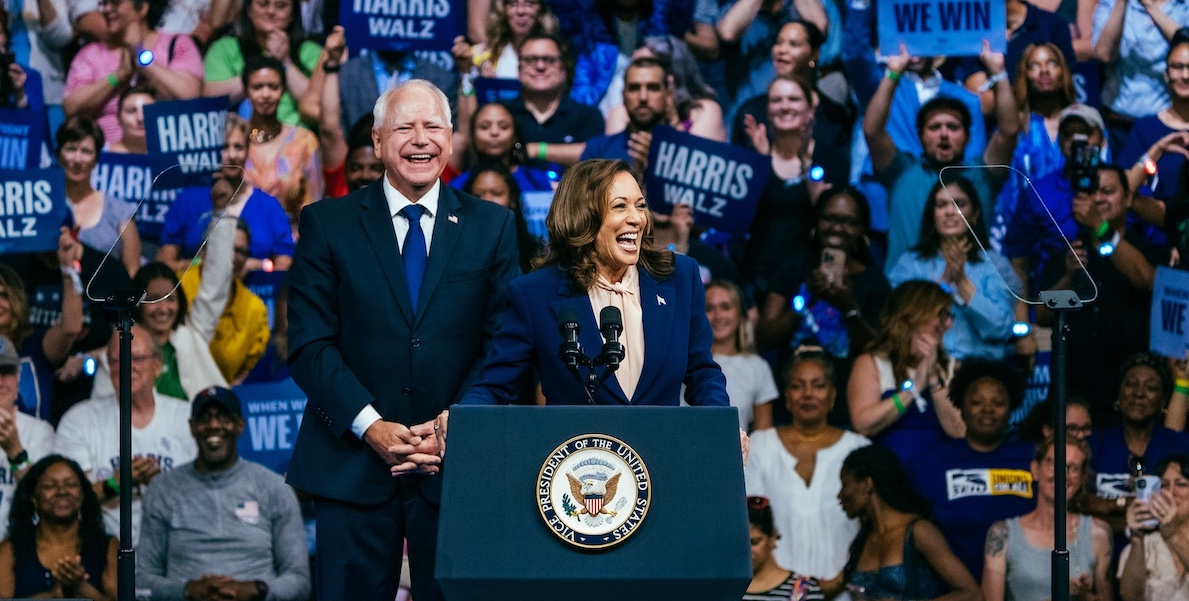Even before being named as Kamala Harris’s running mate, Minnesota Gov. Tim Walz had been having a moment. His description of President Trump and J. D. Vance as “weird” resonated with Democratic activists and the Harris campaign. Walz’s online presence for the last two weeks pleased many Democrats. He came across as likable, a great communicator, and someone with a track record of important legislative accomplishments.
More on that later, but first let’s explore why “weird” matters.
Democrats have struggled for years for an effective way to label MAGA politicians. It doesn’t work to say that they are extreme, or cruel, or pose an existential threat to democracy. For one thing, extremist politicians prefer to see themselves as strong and their opponents (or enemies) as scared of them. President Biden tried to define himself as democracy’s last best chance, but either the message or messenger failed to catch fire.
By contrast, “weird” provides an apt and understandable tag for terminally online right-wing politicians. Most Americans celebrated last week’s return of American hostages from Russia. Yet Donald Trump complained that somehow Americans were shortchanged, and he extended his best wishes to Vladimir Putin. As Walz has pointed out, these aren’t the reactions of his Republican neighbors or family members.
“Weird” has taken off for the same reason that President Biden’s debate doomed his campaign: It confirms and clarifies the views or fears that people already had.
Make America nice again
Walz amplifies a key feature of the Harris campaign: a palpable sense of humor and joy. Republicans have tried, and failed, to make Americans see Kamala Harris’s laugh as awkward. As Walz points out: When was the last time you saw Donald Trump laughing when he wasn’t laughing at someone? By contrast, the image of children hugging Walz and him hugging them back during a signing ceremony to provide free meals to every student in the state embodies the image of a happy warrior.
How does Walz help Harris in Pennsylvania? He speaks to a yearning for American pragmatism and civility that talk radio wounded and (many believe) social media killed. Wouldn’t it be nice if we could make Americans nice again?
Three key constituencies in Pennsylvania (and elsewhere) hold the key for a return to that version of American greatness: young people, anti-MAGA Republicans, and Hispanics.
In policy terms, young people tend to want action on common sense gun reforms, on climate change, and on anything that will make housing affordable. These voters turned out for Biden in large numbers in 2020, but they were not enthused about a Trump-Biden rematch. Young voters are excited by Harris, and here Walz amplifies the sense that the Democratic candidates are normal people, while their opponents are a bit creepy. Moreover, Walz helps clarify the emotional contrast with Trump and Vance.
The blue-collar vote
From the 1950s to the 1990s, the GOP in Pennsylvania favored a strong defense and reproductive rights. The party was represented in the U.S. Senate by stalwart institutionalists such as Arlen Specter and John Heinz. Beginning in the Clinton years, however, they were edged aside by fervent anti-abortion activists such as Rick Santorum. As the GOP became more right wing, educated suburbanites shifted to voting for Democrats. Many blue-collar rural whites, meantime, became Republicans, which is why Pennsylvania remains a swing state.
Harris and Walz are closer to moderate Republicans’ policy views than either Trump or Vance. How these Republicans vote matters greatly. As former Republican Mike Madrid observed, “This election is going to come down to how many Republican voter defections there will be to Harris and how many U.S. born Hispanic men will vote for Trump. That’s it. That’s the race.”
Madrid has persuasively argued that younger, English-speaking Hispanics don’t feel loyal to either party, but that they share the perspectives of other blue-collar workers. This should be great news for the GOP, as Hispanics are the fastest-growing demographic in the Commonwealth. If Latino warehouse workers vote like whites, then Harris will have a hard time winning Pennsylvania.
Latino voters, however, tend to be pragmatic: They want solutions to problems such as the high costs of childcare and housing. Someone with a track record of sensible reforms, who comes across as the former football coach that he is, seems likely to give Latinos a reason to vote Democratic. But Latinos are also famously hard to draw to the polls; which campaign will motivate them to turn out?
The Trump campaign has outsourced its get-out-the-vote operation to political action committees, while the Harris campaign has at least a hundred staffers and more than a dozen offices. Time will tell which is the more effective approach to winning the Keystone State.
John Hinshaw is a professor of history at Lebanon Valley College.
The Citizen welcomes guest commentary from community members who represent that it is their own work and their own opinion based on true facts that they know firsthand.
![]()
MORE ON THE 2024 ELECTION





